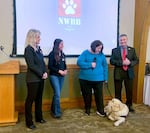
Creed, an 18-month-old English labrador retriever, rests near his veteran's foot at the Northwest Battle Buddies Veterans & Service Dog Graduation in Vancouver, Washington, on Feb. 16, 2024.
Natalie Pate / OPB
Shannon Walker has trained dogs for years, from police canines to thousands of family pets.
But the moment that changed her life’s trajectory was when a veteran came into her boarding and training facility in Washington and asked for help. He was willing to pay for her expertise so his personal dog could become his service dog.
Walker said her father taught her “that when you’re in the presence of a veteran, you’re in the presence of a hero.” She also learned the suicide rate of U.S. veterans — with federal data released last year estimating roughly 17 veterans died by suicide per day in 2021.
So, she got to work.
“When I saw him handling her,” Walker recalled of the veteran, “I saw him find courage inside himself to lead her where he was afraid to go alone.”
Now, Walker is the founder and CEO of Northwest Battle Buddies, a nonprofit based in Southwest Washington that trains service dogs for military veterans from across the country.
Walker stressed that Battle Buddies are not emotional support animals or therapy dogs — they’re service dogs. They undergo more than 360 hours of training over five months to assist in managing post-traumatic stress disorder symptoms, such as interrupting nightmares, intervening in panic attacks and performing pressure therapy. Some also help veterans with impaired vision or balance issues.
The training is completed before the dogs are paired with their veterans. The pairs then receive an additional five weeks of specialized training together and time to bond before graduating.
According to Walker, the program has been a great success. The organization claims a 100% success rate, meaning none of the veterans who have received one of their service dogs has died by suicide.
Since Northwest Battle Buddies started in 2012, it has gifted close to 230 service dogs, with another 45 or more expected to graduate this year. More than 65 of its trained service dogs were shelter dogs.
Walker is especially proud of the organization’s numbers given the challenges of the service dog industry. Other groups, she said, might provide about 10 dogs a year. She said Northwest Battle Buddies is one of the largest providers in the United States.
“[The veterans in our program] are walking into it like, ‘Is this just going to be another organization that’s going to let us down?’” Walker said. “Well, Northwest Battle Buddies is not. We don’t give empty promises. We give service dogs that save and change lives. That’s what we do.”

Northwest Battle Buddies leaders Shannon Walker, left, and Ovie Muntean, right, stand with a trainer and recipient at the veterans and service dog graduation ceremony at the Royal Oaks Country Club in Vancouver, Washington, on Feb. 16, 2024. Northwest Battle Buddies is a nonprofit based in Southwest Washington that trains service dogs for military veterans from across the country.
Natalie Pate / OPB
Walker addressed a crowded ballroom at the Royal Oaks Country Club in Vancouver in February. Dozens of people — including families, donors and trainers — attended the veteran and canine graduation ceremony, some traveling from other states to participate.
An American flag was posted at the entrance. Boxes of tissues sat in the center of each table. Several dogs lay on the floor at their partners’ feet.
“The veterans who will be standing before you are not the same men and women that we met five weeks ago,” Walker told the crowd. “The people who love them would tell you the same thing. And it is just the beginning.”
The organization spends about $25,000 per dog, but the veterans are gifted the dog for free. Walker thanked donors for their contributions, which allowed this to happen. Most of the money that pays for the program comes from private donors, but Battle Buddies also receives some grants and government funding.
The veterans are responsible for costs after they graduate, but Battle Buddies provides each pair with a crate and materials, plus a $500 check from the Washington-based nonprofit 4 the Fallen to cover initial expenses. Ten veterans and their dogs graduated at the February event.
“I just kept taking the next step and the next,” one veteran said of the experience, standing next to her dog. “At times, it was just because I attended to him and kept him safe, and in doing that, I kept me safe.”
Walker encouraged each of the veterans in the crowd, some of whom were former program graduates, to keep going.
“You never quit on yourself. You never quit on your Battle Buddy,” she said. “We will fight for you, and we will stand with you, and we will be there for you. As long as you have a Battle Buddy, we are there for you because you’re a part of our family.”
